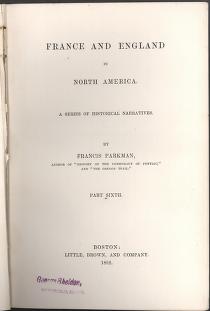
Francis Parkman
(1823-1893)
Francis Parkman was born into a wealthy and prominent family in Boston, Massachusetts. He attended Harvard, and in his sophomore year decided to write a history of the "Old French War" (King George's War of the 1740s). When he graduated in 1845 he traveled to the West to see the places he had studied and to view the Indians of the Northwest. The result, in 1849, was the book "The Oregon Trail." Although he struggled with illness in subsequent years, Parkman was able to produce other works of American history, including "The Conspiracy of Pontiac" (1851), "The Old Regime in Canada" (1874), and "Montcalm and Wolfe" (1884). His last book was "France and England in North America" (1892), which includes a description of the 1704 raid on Deerfield, Massachusetts, by French and Native allies during Queen Anne's War (1701-1713). Parkman's books mirrored their times, and today's criticisms of his works include his treatment of Native peoples, whom he most often portrayed as undifferentiated "savages." Parkman's literary skills made for readable, dynamic histories, however, that were appreciated as much for their style as for their content.